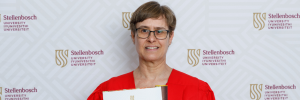
Prof Sonja Mouton loves the beauty and elegance of Banach algebras
Prof Sonja Mouton from the Mathematics Division in the Department of Mathematical Sciences in the Faculty of Science delivered her inaugural lecture on Tuesday 3 October 2023. The title of her lecture was “Spectral theory in ordered Banach algebras".
Mouton, who also leads the Functional Analysis Research Group, spoke to the Corporate Communication and Marketing Division about her work and her love for mathematics.
Tell us more about your research and why you became interested in this specific field.
My research focuses on aspects of spectral theory in Banach algebras and ordered Banach algebras, named after Polish mathematician Stefan Banach. Spectral theory is, on the one hand, a generalisation of the theory of eigenvalues of matrices, and on the other hand, related to certain inverse operators that arise naturally in connection with the problem of solving differential and integral equations. The spectral theory of positive operators is of particular interest in analysis. It is often desirable to develop generalisations to more abstract contexts, and in my PhD, I considered the more general case of spectral theory of positive elements (in Banach algebras with orderings). This turned out to be a beautiful area of mathematics, with many interesting problems to solve and several elegant techniques available, and so I decided to remain in this field.
What are some of the real-world applications of your work?
Being pure mathematics, my research does not (yet) have any real-world applications. Theorems in mathematics have applications in mathematics itself in the sense that they are used to further develop mathematical theory, with the possibility of leading to real-world applications after several decades or even centuries. However, although I would not go as far as actively hoping that my results will never have any real-world applications (as the famous English mathematician Godfrey Harold Hardy did), whether or not that eventually happens is of no importance to me.
You have spent many years in the challenging environment of higher education. What keeps you going when things get tough?
I think it is important to distinguish between “challenges" and “obstacles". Challenges (such as having to balance many different roles as an academic) comes with the territory and one learns to deal with those satisfactorily. Obstacles, which should not be there in the first place, are the real problem. These include things such as the replacement of chalkboards with malfunctioning electronic equipment in the lecture venues, and the excessive and growing amount of senseless paperwork that has to be done. What keeps me going while continuously facing these obstacles? Usually, the fact that, as an academic without many managing responsibilities, at least I still get the opportunity on a regular basis to engage with the subject that I love, via teaching and research. On really bad days, the knowledge that I need the money to retire!
What do you like most about your work?
As probably most mathematicians would say, nothing beats the immense feeling of satisfaction when, after months or even years of hard work, the last piece of the puzzle is found and your new theorem is completed.
What is your message to young girls who aspire to a career in mathematics?
My advice to any young pupil or student who considers a career in mathematics, is to make sure that you know what mathematics really is and that you have the necessary competence, before making this decision, and then to commit to working hard. This may not be “fashionable" advice, but it is the “correct" advice. Contrary to popular modern beliefs, mathematics is not for everyone, and everything in life is not supposed to be easy and fun, at least not immediately. This is why, unfortunately, many people do not experience the intense pleasure of achieving results through continuous perseverance. The only additional advice I have for girls, in particular, is to not buy into the idea that you are special since you are female. In any institution with integrity, you will be judged on your merits alone. For instance, I consider myself to be just a “mathematician"; I refused to be referred to as a “woman in mathematics".
Tell us something exciting about yourself that people would not expect.
In my younger days, I was a fairly competent pianist, and I seriously considered a career as a musician, before I finally decided to study mathematics and science instead. I still like to play the piano now and then, although my time is, unfortunately, limited. Also, I have an immense love for animals, and at times our home is a veritable zoo, with dogs, guinea pigs and birds.
How do you spend your free time?
I spend as much time as possible with my husband, my two dogs and, in particular, my senior guinea pig, Rageltjie, who is almost seven years old. While I care for Rageltjie, I listen to music, mostly Bach, and before going to sleep I read crime novels to relax.
- Photo: Prof Sonja Mouton at her inaugural lecture: Photographer: Ignus Dreyer
